Claudia's Posture Story
In keeping with Claudia’s wishes we are not going to use any photographs of her in this blog post. We are always happy to respect our contributors' wishes for privacy. We are very grateful for Claudia’s generosity in sharing her personal posture journey, and are sure that you, our readers, will appreciate it too.
—Esther Gokhale
How I came to the Gokhale Method
I decided to take the course with Esther in person for a few reasons—firstly, I have received emails periodically about her offerings for some years and actually live close to Palo Alto where she is based. Secondly, I have been having some physical challenges recently. Lastly, my 93-year-old mother passed away in December and I felt that, after settling her estate, taking the Foundations course would make good use of some of what I received. I felt, “this is my gift from my mother.” It would make my mother happy to know this is what I’ve done…
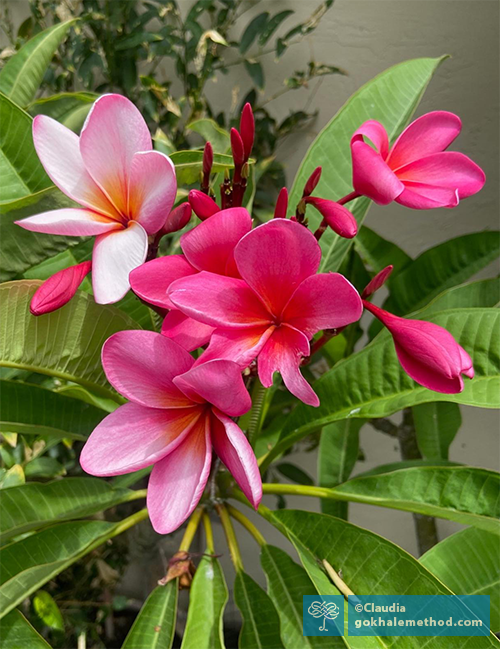
Towards the end of my Foundation course, our garden burst forth with abundant, fragrant plumeria flowers. I brought some to Esther for my lesson and she remembered them very fondly as Champa, or frangipani flowers, from growing up in India. Image by Claudia
Improvements despite hip arthritis and osteoporosis
A few years back I was walking with a friend and my toe somehow got caught in a brick-paved area—I don’t even remember falling, but found myself on the ground. I broke my humerus and radius. I knew I had osteoporosis, and guessed it had gotten worse—my doctor wanted to put me on medication for it, but the more I read the less I wanted to take that route—so I looked into other possibilities.
If you are prone to tripping, the Gokhale Method Toe Tap exercise will strengthen your tibialis anterior, the shin muscle whose tendon lifts the front of your foot clear of the ground.
I fell again a couple of years later and didn’t break anything, but I did say to my doctor how stiff my hips were feeling, despite being so active. He advised me to get an X-ray, which confirmed that I had severe hip arthritis. This surprised me as I am very active and used to run marathons—my doctor told me right away that I should get hip replacements. I thought, “I am going to explore every alternative route.”
I have also been working on my osteoporosis since my first fall, in 2020. Every week I do Osteostrong®, using weight machines that are geared for building your bones, and take a high-quality calcium and strontium supplement. I think these measures, combined with the healthy posture I learned with the Gokhale Method aligning my bones well to respond to gravity on a daily basis, are producing significant results. I recently got my DEXA scan for the last year and my spine bone density improved by 10% and my hip bone density 20.5%, to which my doctor said “Wow!”.
Early success motivated me to discover glidewalking
My Foundations one-on-one course was six weeks of learning a couple of new posture techniques each week, and working to incorporate these into my daily life. I worked really hard all week between lessons, practicing and rereading the book—I felt very motivated to be prepared for the next week’s lesson as I was having some immediate success. I often found it helpful to look in the mirror to check my posture learning, just to be sure of what I was doing—for example, to see that I was keeping my shoulders rolled back.
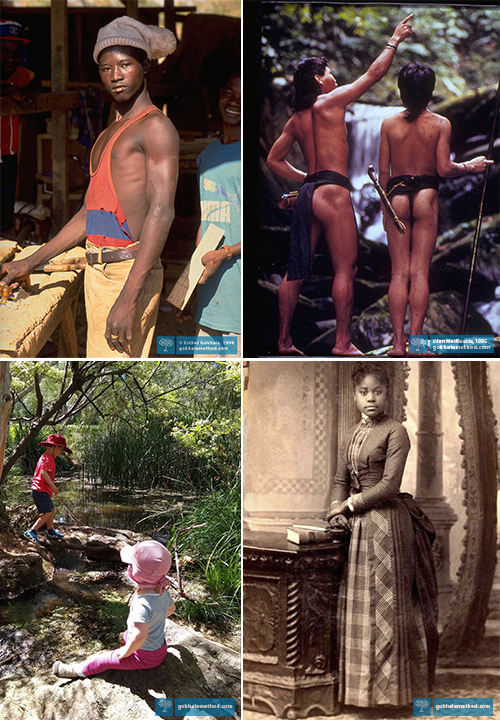
Our shoulders are naturally positioned in a posterior position that gives space for the joint, muscles, tendons, blood vessels, and nerves that populate the shoulder girdle. Shoulder rolls can gradually return hunched shoulders to this healthier arrangement. You can learn to shoulder roll with this free video.
Other new things, such as glidewalking, felt like there was almost too much much to think about when I first learned the techniques, but slowly, steadily, my body just adapted. It was wonderful how all the pieces of the glidewalking instruction came together for me.
I work two days a week and I go for a long walk on my lunch break. With this regular practice, I was able to incrementally regain the flow in my walk… I could just keep going, and I no longer had any of the tension in my hip muscles that had crept in. It was like I just floated along. My body relaxed into it and there was a beautiful, primal familiarity: This is how good I used to feel.
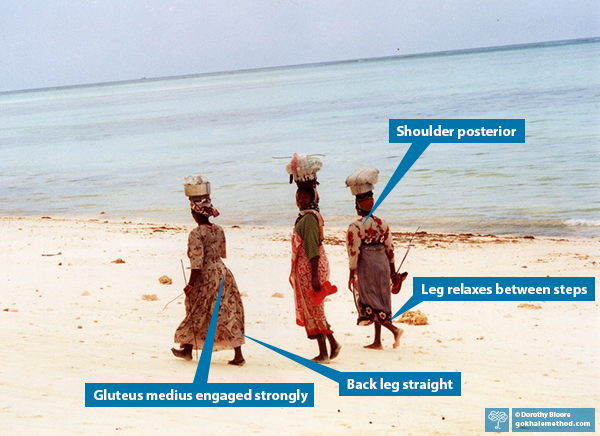
Our natural gait pattern is optimal for our entire structure. For Alumni seeking to deepen their experience of glidewalking, the online Advanced Glidewalking course is designed to do just that. The next course starts October 7.
How the Gokhale Method helps me at my job
For years I had my own lettering design studio, and then eleven years ago I started working for Trader Joe’s as a signwriter, doing the handwritten chalk boards and pricing signs.
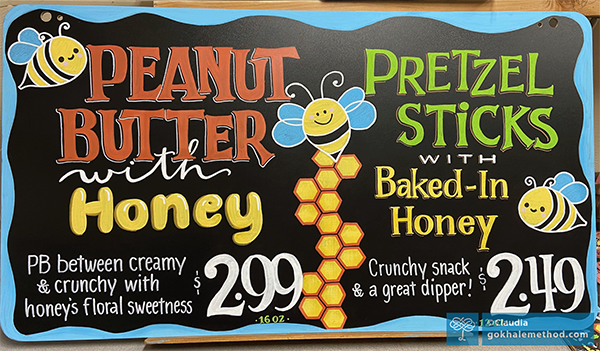
For those of you unfamiliar with Trader Joe’s signs, here is a taste of my artwork. Image by Claudia
My Gokhale Method course helped me a lot, as we often ended up hunched over our work at flat tables. Esther gave me some suggestions which I try to pass on to the many younger people in their twenties working there who are getting back pain. For example, we have brought in some drawing boards to slant back like easels and enable us to work in a more upright posture at the tables.
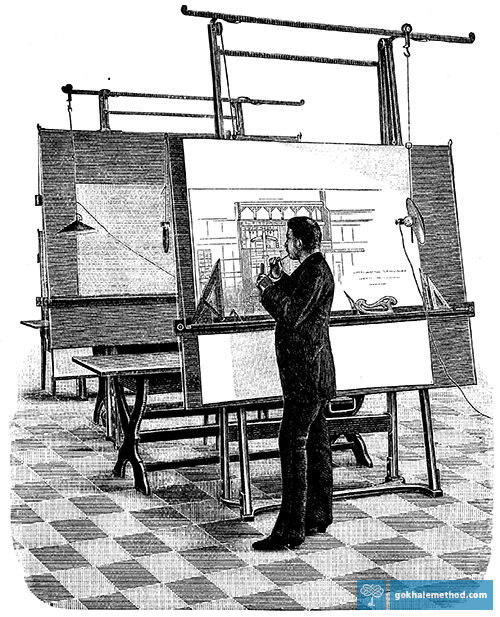
In bygone eras people would commonly use a slanted surface or easel for writing, drawing, and painting, rather than hunching over. This drawing is from an 1893 technical journal. Image from Wikimedia Commons
For my hips, the hardest thing is sitting for too long and not moving. Esther encouraged me to take movement breaks to stretch out my psoas and hip muscles, so I get up and find things that need doing around the store. I do have a Gokhale™Pain-Free Chair at home, and I wish I had one at work because I love it. The seat angle of this chair situates my hips perfectly and then I can put my behind behind and let the nubs in the back hold my spine just right. It makes my hips and spine very happy!
This video explains how and why the design of the Gokhale® Pain-Free Chair makes it uniquely comfortable—and therapeutic.
I also pay particular attention to my shoulders and my chin when at work. When I first started with Esther, she told me that I walked around with my chin way up, so I have learned to lengthen the back of my neck and keep my chin down now.
Building on my Foundations course
I finished my Foundations course at the end of June. But there were still some things around hip-hinging that needed gelling for me. So I went back August 1st, and am so glad I got the extra help I needed with my hips. Due to my severe hip arthritis Esther realized that I needed to start with a smaller range of motion and plenty of support, so she came up with ideas like me leaning on a table or wall to bend, and was constantly offering alternatives that enabled me to get a feel for where I was heading.
One of the details Esther noticed was that I held my lower belly in all the time. All my life I had thought that was important; now I know to practice relaxing that area to allow for the alignment I need at the hips.
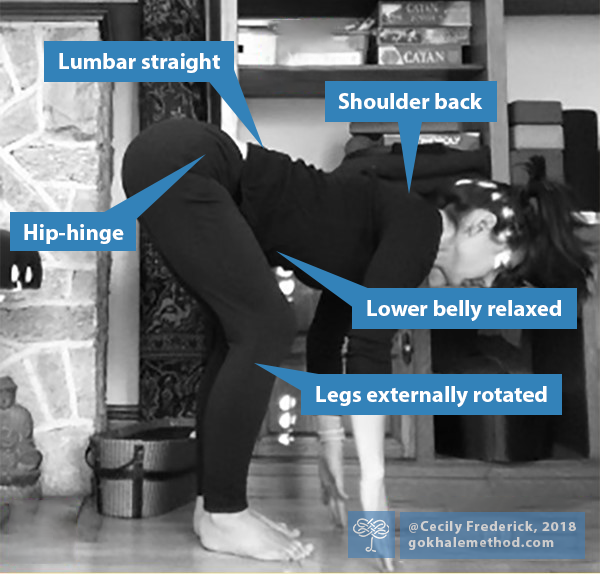
Bending deeply happens most easily with the thighs out of the way (externally rotated and wide) and the lower belly relaxed.
Another thing that I needed to experience was the way that kidney bean shaping the feet enabled the rest of the leg to open up and externally rotate, which again changes things in the hip joint. We did that over and over so eventually I got to feel and manifest that difference. I now know so many aspects of natural posture that will improve my joint health.
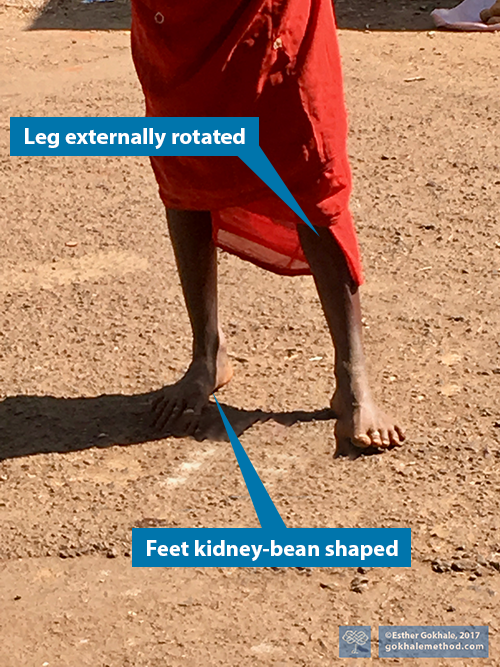
Our foot’s natural kidney-bean shape and outward angle helps to support healthy hip joint architecture.
Healthy posture and what the future holds
I definitely feel I can go further in changing my posture. I have signed up for the Online University—I often do the daily program, and then there is so much more I can access in the video library. I sometimes find there’s something lands that I didn’t get the first time around. At the very least, I’m inspired by the daily reminder email.
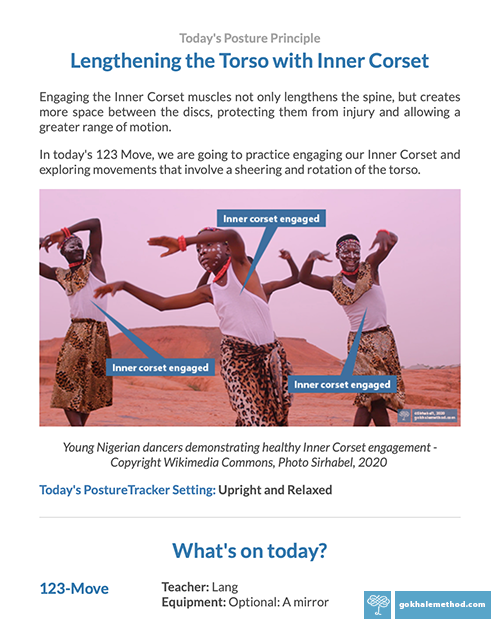
Each day your Gokhale Exercise email tells you what’s on, and gives you a visual reminder of the daily Posture Principle.
I still regularly refer to Esther’s book, 8 Steps to a Pain-Free Back, which has so many layers of interesting information that I’m aware I haven’t yet fully absorbed. I am only at the tip of the iceberg with this beautiful Gokhale Method, but it has already been life-changing. This really is life-long inspiration and learning!
Best next action steps
If you would like to start or reboot your healthy posture journey, book a consultation, online or in person, with one of our teachers.
You can sign up below to join any one of our upcoming FREE Online Workshops…
If you are prone to tripping, the Gokhale Method Toe Tap exercise will strengthen your tibialis anterior, the shin muscle whose tendon lifts the front of your foot clear of the ground.

Comments
QUESTION: In regards to the
QUESTION: In regards to the belly being "held in" upon doing any hip-hinging, I am confused. As a personal trainer, I was taught to hold the abs/belly in upon doing the bend to "protect" the back vs. letting it relax ... this always made sense to me until I read your article. I was told in effect to hold it taut so as not to put all weight on the back. It is important that I understand this, so if you can please explain and clarify more? Thank you.
Thank you for your question.
Thank you for your question. Tensing the lower belly, for some people, will mean activating the lower portion of rectus abdominis, which attaches to the pubic bone, and this tension will therefore tuck the pelvis—not what we want. For such students, learning to let go of this more superficial abdominal contraction is therefore important. They learn to stabilize the spine with the deeper muscles of the inner corset, which includes transverse abdominis. I hope that explains the context for relaxing the lower belly.
Add New Comment
Login to add commment
Login